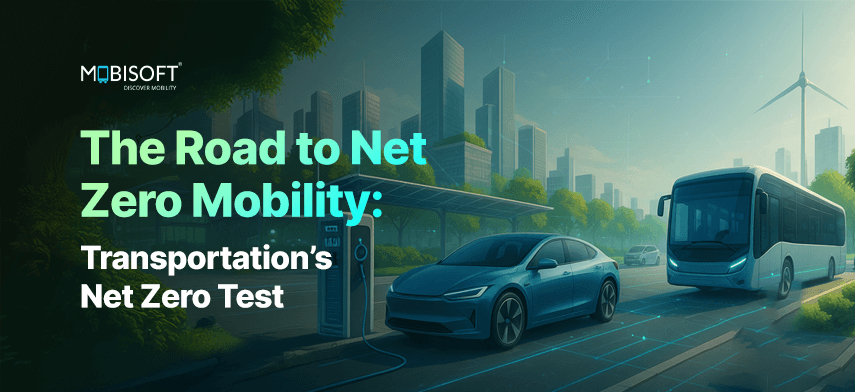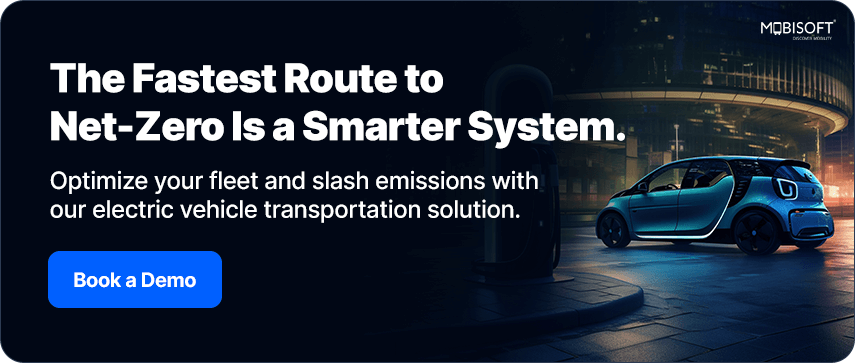-
Fil d’actualités
- EXPLORER
-
Pages
-
Groupes
-
Evènements
-
Reels
-
Blogs
-
Offres
-
Emplois
-
Forums
-
Film
The Road to Net Zero Mobility: Transportation’s Net Zero Test

Every minute, planes take off, trucks move on highways, buses carry employees, and cars transport commuters. These trips drive the economy but also create one-quarter of global CO₂ emissions.
Transport is both the engine of growth and the bottleneck to net zero mobility. Road vehicles account for about three-quarters of transportation emissions. Then there’s aviation and shipping, which add their own layers of complexity. More than 140 countries have pledged to hit net zero transportation by 2050. The race is definitely on. But here’s the real question: are we making progress fast enough, or are we simply stuck in the traffic jam on the path to sustainable mobility solutions?
As part of this shift, organizations are increasingly exploring electric vehicle transportation solutions to accelerate their journey toward sustainable mobility.
For logistics leaders, airline managers, corporates, and event organizers, the question goes beyond climate talk. This is about making operations resilient for the future. It means looking for ways to trim costs wherever you can. At the same time, there’s pressure to build trust with stakeholders. It matters more as sustainable transportation gives you an edge in the field.
What Transportation Leaders Think: Balancing Carbon, Costs, and Credibility
For transportation and logistics leaders, the debate over mobility decarbonization is no longer abstract. It shows up in three pressing conversations inside boardrooms and operations centers:
How do we actually cut carbon without disrupting service?
Leaders recognize that the simplest efficiency gains are usually the first to cut down empty miles, combining trips and shifting toward shared models like carpooling or shuttle pooling. The tougher work comes later. Moving beyond pilot programs needs a real strategy if you want measurable, scalable impact across fleets and networks. This is where net zero transportation strategies 2025 are starting to take shape.
How will this shape the image of our brand?
Sustainability is now a reputational marker. Airlines that digitize crew transport, corporates that reduce Scope 3 emissions, or event organizers who showcase eco-fleets all strengthen their brand value. For leaders, the risk is being perceived as lagging when peers and competitors step forward with zero emission transportation or green transport technologies.
How do we future-proof operations while staying cost-efficient?
Decarbonization goes beyond the compliance box. It’s about keeping operations strong. Using smart mobility solutions, predictive maintenance, and platforms that connect the whole system helps lower costs right now. The tools set businesses up for a future shaped by carbon pricing, green procurement policies, and scrutiny from investors. For many leaders, this dual focus with sustainability and OPEX optimization is the real decision driver.
To sum up, leaders view transport decarbonization as a strategic chance to cut emissions, enhance brand credibility, and further build operations that are ready for what comes next.

Current Obstacles on the Road to Net Zero Mobility
Despite bold pledges and rising awareness, most transport and logistics teams hit real roadblocks in net zero logistics and mobility decarbonization.
Lack of Reliable Data and Reporting
Many organizations struggle to see their true emissions. Without fleet-level visibility, leaders cannot set baselines, measure progress, or back up their sustainability claims. This is one of the key challenges to net zero mobility.
Fragmented and Manual Processes
Operations are often managed through spreadsheets, calls, and disconnected systems. This leads to inefficiencies like empty miles, idle vehicles, and delayed schedules, directly inflating carbon output.
Limited Integration Across Functions
Transport operations rarely sync with HR, ERP, flight schedules, or event accreditation systems. The result? Overlaps, unnecessary trips, and wasted resources that could otherwise be avoided.
Read More: https://mobisoftinfotech.com/resources/blog/transportation-logistics/net-zero-mobility-transportation-decarbonization
- AI
- Vitamins
- Health
- Admin/office jobs
- News
- Art
- Causes
- Crafts
- Dance
- Drinks
- Film
- Fitness
- Food
- Jeux
- Gardening
- Health
- Domicile
- Literature
- Music
- Networking
- Autre
- Party
- Religion
- Shopping
- Sports
- Theater
- Wellness


